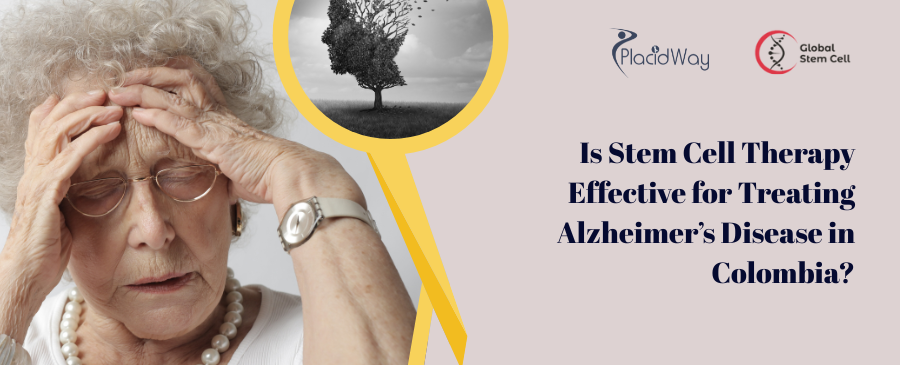
Alzheimer’s disease, a progressive neurodegenerative disorder, poses significant challenges for both patients and their loved ones. Despite extensive research, finding a cure remains elusive. However, advancements in medical science offer a glimmer of hope, particularly through innovative treatments like stem cell therapy.
In this blog post, we delve into the realm of stem cell therapy for Alzheimer’s disease, focusing on its benefits, why Thailand emerges as a promising destination, top hospitals offering this treatment, the procedure involved, and common questions surrounding this therapy.
Table of Content
Benefits of Stem Cell Therapy for Alzheimer’s disease
Stem cell therapy holds promise as a potential treatment for Alzheimer’s disease due to its ability to regenerate and repair damaged brain tissue. Here are some of the potential benefits:
- Neuroregeneration: Stem cells have the capability to differentiate into various cell types, including neurons. In Alzheimer’s disease, where neurons are progressively lost, stem cells could potentially replace damaged or lost neurons, contributing to the restoration of brain function.
- Neuroprotection: Stem cells release neurotrophic factors and other molecules that promote the survival and growth of neurons. By providing a supportive environment for existing neurons, stem cell therapy may help protect against further degeneration in Alzheimer’s patients.
- Modulation of Inflammation: Alzheimer’s disease involves chronic inflammation in the brain, which contributes to neuronal damage. Stem cells have immunomodulatory properties and can regulate inflammatory responses, potentially reducing neuroinflammation associated with the disease.
- Enhanced Cognitive Function: Studies have suggested that stem cell therapy may lead to improvements in cognitive function in Alzheimer’s patients. This could manifest as improvements in memory, attention, and overall cognitive abilities.
- Potential Disease Modification: While current treatments for Alzheimer’s focus on managing symptoms, stem cell therapy has the potential to modify the course of the disease by addressing its underlying causes, such as neuronal loss and pathological protein aggregates like beta-amyloid plaques and tau tangles.
- Minimized Side Effects: Compared to conventional pharmacological treatments, stem cell therapy may offer a safer and more targeted approach with fewer adverse effects, as it aims to restore normal cellular function rather than simply modulating symptoms.
- Long-lasting Effects: Stem cells can integrate into existing brain circuitry and continue to function over an extended period, potentially providing long-lasting benefits to Alzheimer’s patients.
Why choose Stem Cell Therapy for Alzheimer’s disease in Thailand?
Choosing stem cell therapy for Alzheimer’s disease in Thailand may have several advantages:
- Advanced Research and Technology: Thailand has made significant advancements in stem cell research and therapy. Leading hospitals and research centers in Thailand are equipped with state-of-the-art technology and facilities for conducting stem cell-based treatments.
- Experienced Medical Professionals: Thailand boasts a skilled workforce of medical professionals, including doctors, researchers, and specialists, who have expertise in stem cell therapy. These professionals often receive training and collaborate with international experts, ensuring high-quality care for patients.
- Regulatory Framework: Thailand has established regulatory frameworks for stem cell therapy, ensuring that treatments adhere to safety and ethical standards. This provides reassurance to patients regarding the quality and legitimacy of the treatment they receive.
- Cost-effectiveness: Compared to some Western countries, the cost of healthcare, including stem cell therapy, in Thailand can be more affordable. This makes it an attractive option for patients seeking advanced treatments at a lower cost.
- Medical Tourism Infrastructure: Thailand is renowned for its medical tourism industry, with numerous hospitals and clinics catering to international patients. These facilities often provide comprehensive services, including assistance with travel arrangements, accommodation, and translation services, making the treatment process more convenient for international patients and their families.
- Privacy and Comfort: Many medical facilities in Thailand offer private and comfortable accommodations for patients and their families. This can enhance the overall treatment experience and contribute to the well-being of patients undergoing stem cell therapy.
- Alternative Therapies and Wellness Programs: In addition to stem cell therapy, patients in Thailand may have access to complementary and alternative therapies, as well as wellness programs, that can support their overall health and well-being during and after treatment.
Best hospitals for Stem Cell Therapy for Alzheimer’s disease in Thailand
In Thailand, several hospitals and clinics offer stem cell therapy for Alzheimer’s disease, providing patients with access to advanced treatments and skilled medical professionals. Among these establishments, Vega Stem Cell Clinic stands out as a leading institution dedicated to innovative regenerative therapies. Here’s why Vega Stem Cell Clinic is considered one of the best hospitals for stem cell therapy for Alzheimer’s disease in Thailand:
- Specialization in Stem Cell Therapy: Vega Stem Cell Clinic specializes in stem cell-based treatments, with a focus on regenerative medicine for various neurological conditions, including Alzheimer’s disease. Their expertise in this field ensures that patients receive personalized care and cutting-edge therapies tailored to their specific needs.
- Experienced Medical Team: The clinic is staffed by a multidisciplinary team of experienced medical professionals, including doctors, researchers, and specialists in regenerative medicine. These experts collaborate to provide comprehensive care, from initial assessment to post-treatment follow-up, ensuring the best possible outcomes for patients.
- State-of-the-Art Facilities: Vega Stem Cell Clinic is equipped with state-of-the-art facilities and technology for stem cell therapy, adhering to international standards of quality and safety. Their modern infrastructure enables the delivery of advanced treatments in a comfortable and supportive environment.
- Research and Innovation: The clinic is actively involved in research and innovation in the field of regenerative medicine, contributing to advancements in stem cell therapy for Alzheimer’s disease and other neurological disorders. Their commitment to ongoing research ensures that patients benefit from the latest developments and breakthroughs in the field.
- Patient-Centered Approach: Vega Stem Cell Clinic prioritizes the well-being and satisfaction of their patients, offering personalized treatment plans and compassionate care throughout the treatment process. Their patient-centered approach focuses on addressing individual needs and concerns, fostering trust and confidence among patients and their families.
- Comprehensive Services: In addition to stem cell therapy, Vega Stem Cell Clinic provides a range of complementary services to support the overall health and well-being of patients. These may include diagnostic evaluations, rehabilitation programs, and lifestyle interventions aimed at optimizing treatment outcomes and enhancing quality of life.
- International Reputation: Vega Stem Cell Clinic has gained recognition on an international level for their excellence in stem cell therapy and regenerative medicine. Patients from around the world seek treatment at the clinic, attracted by its reputation for delivering high-quality care and achieving positive results.
Procedure of Stem Cell Therapy for Alzheimer’s disease in Thailand
While specific procedures for stem cell therapy for Alzheimer’s disease may vary slightly depending on the clinic or hospital, the general process typically involves several key steps:
- Initial Consultation and Evaluation: The first step is an initial consultation with a medical professional specializing in stem cell therapy for Alzheimer’s disease. During this consultation, the patient’s medical history, current symptoms, and diagnostic test results are reviewed to determine eligibility for treatment. The medical team discusses the potential benefits, risks, and expectations of stem cell therapy with the patient and their family.
- Pre-Treatment Assessment: Before undergoing stem cell therapy, the patient may undergo further assessments, including neurological evaluations, imaging studies (such as MRI or PET scans), and laboratory tests to assess baseline cognitive function and overall health.
- Preparation for Stem Cell Collection: If autologous stem cell therapy is planned (using the patient’s own stem cells), the patient may undergo a procedure to collect stem cells from their bone marrow or adipose tissue (fat) under local anesthesia. Alternatively, stem cells may be sourced from umbilical cord blood or other ethically obtained sources.
- Stem Cell Processing and Expansion: The collected stem cells are processed and prepared for administration. This may involve isolating and purifying the stem cells, as well as expanding their numbers in the laboratory through cell culture techniques to obtain a sufficient dose for treatment.
- Stem Cell Administration: Once prepared, the stem cells are administered to the patient using various delivery methods. Common routes of administration for stem cell therapy in Alzheimer’s disease may include intravenous (IV) infusion, intrathecal (into the cerebrospinal fluid), or intracerebral (directly into the brain) injection. The specific method chosen depends on factors such as the patient’s condition, treatment goals, and medical recommendations.
- Monitoring and Follow-up: After stem cell administration, the patient is closely monitored for any immediate adverse reactions or complications. Follow-up appointments are scheduled to assess the patient’s response to treatment, monitor cognitive function and overall health, and adjust the treatment plan as needed. Additional sessions of stem cell therapy may be recommended based on the patient’s progress and individual circumstances.
FAQs Stem Cell Therapy for Alzheimer’s disease in Thailand
Certainly! Here are some frequently asked questions (FAQs) about stem cell therapy for Alzheimer’s disease in Thailand:
How does stem cell therapy work for Alzheimer’s disease?
Stem cells have the ability to differentiate into various cell types, including neurons. When administered to patients with Alzheimer’s disease, stem cells may integrate into the brain, replace damaged neurons, and modulate inflammatory responses, potentially slowing disease progression and improving symptoms.
Is stem cell therapy for Alzheimer’s disease safe?
While stem cell therapy shows promise as a potential treatment for Alzheimer’s disease, its safety and efficacy are still being studied in clinical trials. Patients considering stem cell therapy should discuss the potential risks and benefits with qualified medical professionals and ensure that any treatment they pursue adheres to established safety and ethical standards.
What types of stem cells are used in therapy for Alzheimer’s disease?
Different types of stem cells may be used in therapy for Alzheimer’s disease, including mesenchymal stem cells (MSCs), neural stem cells, and induced pluripotent stem cells (iPSCs). The choice of stem cell type may depend on factors such as treatment goals, patient characteristics, and medical recommendations.
How long does stem cell therapy for Alzheimer’s disease take?
The duration of stem cell therapy for Alzheimer’s disease may vary depending on factors such as the treatment protocol, the patient’s response to therapy, and the frequency of follow-up appointments. Patients should consult with their healthcare providers to get a better understanding of the treatment timeline.
Ready to explore stem cell therapy for Alzheimer’s disease in Thailand? Contact us today to learn more and take the first step towards potentially improving cognitive function and quality of life.





